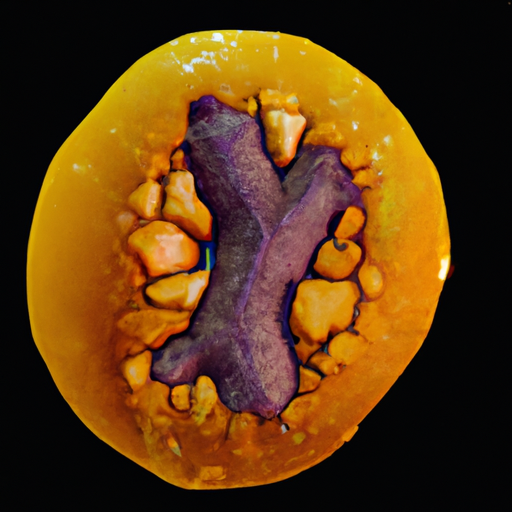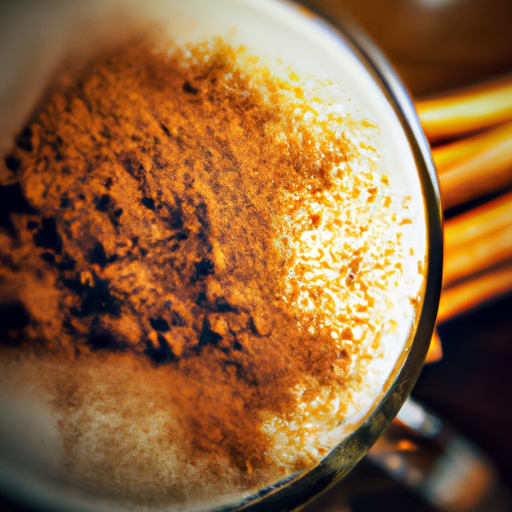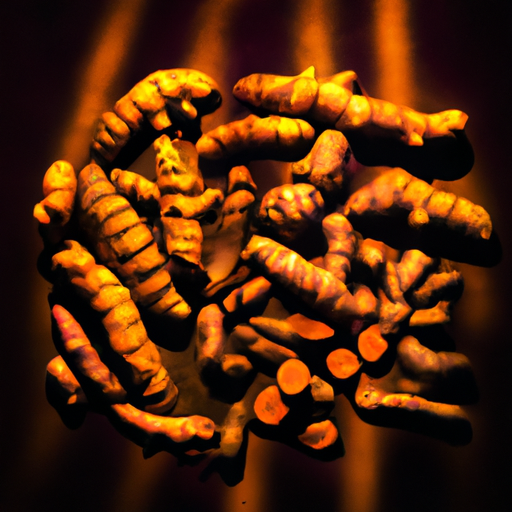Having suffered from the agony and inconvenience of kidney stones, I comprehend the significance of being mindful of possible triggers. Turmeric, a natural remedy that has become increasingly popular, is known for its anti-inflammatory and antioxidant properties. It is commonly utilized in traditional medicine to address various health issues. Nevertheless, there has been some debate regarding its usage and its potential link to kidney stones.
In this article, we will explore the evidence and discuss whether or not turmeric is a safe choice for those with a history of kidney stones. Imagine waking up in the middle of the night with excruciating pain in your back and abdomen. You rush to the emergency room only to find out that you have a kidney stone. This scenario is all too familiar to those who have suffered from this condition.
Kidney stones are hard deposits that form in the kidneys and can cause severe pain as they travel through the urinary tract. While there are many factors that contribute to their formation, including genetics, diet, and lifestyle, some people are concerned that turmeric may be a contributing factor. In the following sections, we will explore the evidence and provide some tips for incorporating turmeric into your diet safely.
Key Takeaways
- Turmeric contains oxalates, which can be harmful to those with oxalate intolerance or history of kidney stones.
- High doses of turmeric may increase the risk of kidney stone formation due to increased urinary oxalate levels.
- Some animal studies suggest an increased risk of kidney damage and stone formation, but human studies have found no significant association.
- Prevention of kidney stones should involve a comprehensive approach addressing multiple factors, including hydration and oxalate intake.
Understanding Kidney Stones
Kidney stones can be excruciatingly painful, but understanding what they are and how they form can help prevent future episodes. Preventing kidney stones requires knowledge of the common causes of kidney stones.
Kidney stones are solid masses that form from substances in the urine. These substances can crystalize and stick together, forming stones. The most common types of kidney stones are calcium oxalate stones, which form when there’s too much calcium and oxalate in the urine. Other common types include uric acid stones, struvite stones, and cystine stones.
Common causes of kidney stones include dehydration, a diet high in salt and animal protein, and certain medical conditions such as hyperparathyroidism and inflammatory bowel disease. Family history, obesity, and urinary tract infections can also increase the risk of kidney stones.
Preventing kidney stones involves staying hydrated, eating a healthy diet low in salt and animal protein, and talking to a healthcare provider about any medical conditions or medications that may increase the risk of kidney stones. With this knowledge, we can now move on to understanding what’s turmeric and its potential effects on kidney stones.
What is Turmeric?
You probably know turmeric as the bright yellow spice commonly used in Indian cuisine. But did you know that it has been used for its medicinal properties for centuries? Turmeric contains a compound called curcumin which has been shown to have anti-inflammatory and antioxidant effects, making it useful for a variety of health conditions.
There are many potential health benefits of turmeric, including reducing inflammation, improving brain function, and even potentially reducing the risk of certain types of cancer. Turmeric can be consumed in a variety of ways, including as a spice in cooking, as a supplement in pill form, or even as a tea. There are countless turmeric recipes out there, including turmeric lattes, curries, and even smoothies. Incorporating turmeric into your diet may be a simple way to improve your overall health.
However, there is some controversy surrounding turmeric and kidney stones.
The Controversy Surrounding Turmeric and Kidney Stones
Amidst the ongoing Turmeric controversy, concerns have been raised about whether this spice can cause kidney stones. While Turmeric has been touted for its potential health benefits, including anti-inflammatory and antioxidant properties, some research suggests that high doses of Turmeric may increase the risk of kidney stone formation. However, the evidence is mixed, and more research is needed to determine whether Turmeric is a risk factor for kidney stones.
Studies have shown that high doses of Turmeric supplements can increase urinary oxalate levels, which is a risk factor for kidney stone formation.
Some animal studies have suggested that Turmeric may increase the risk of kidney damage and stone formation.
However, other studies have found no significant association between Turmeric intake and kidney stones in humans.
It is important to note that the controversy surrounding Turmeric and kidney stones is still ongoing, and more research is needed to determine the true impact of this spice on kidney health.
In the following section, we will explore the role of oxalates in kidney stone formation and how they relate to Turmeric consumption.
The Role of Oxalates in Kidney Stone Formation
As a researcher interested in the relationship between turmeric and kidney stones, I’ve come across the topic of oxalates and their role in kidney stone formation.
Oxalates are molecules found in many foods that can bind with calcium to form kidney stones. Some foods, such as spinach and rhubarb, are particularly high in oxalates. Therefore, it’s important to be aware of these when considering dietary choices.
This leads me to wonder about the relationship between turmeric and oxalates. Could turmeric consumption potentially contribute to kidney stone formation through its oxalate content?
What are Oxalates?
Knowing about oxalates can help you understand why turmeric is believed to cause kidney stones. Oxalates are natural compounds found in many plant-based foods. These compounds are produced by plants to defend themselves against predators, such as insects and animals. However, when consumed in large amounts, oxalates can be toxic to humans and can lead to the formation of oxalate crystals in the body.
To give you an idea of how much oxalates are found in certain foods, here’s a table showing the oxalate content of some common foods:
| Food | Serving Size | Oxalate Content (mg) |
|---|---|---|
| Spinach | 1 cup | 755 |
| Almonds | 1 oz | 140 |
| Sweet potato | 1 medium | 60 |
| Turmeric | 1 tsp | 3.2 |
As you can see, spinach contains the highest amount of oxalates among these foods. However, it’s important to note that not everyone is equally sensitive to oxalate toxicity and crystal formation. In the next section, we’ll explore which foods are high in oxalates and how they may affect kidney stone formation.
Foods High in Oxalates
To identify which foods you should limit in your diet, take note of those that are high in oxalates. Oxalate is a naturally occurring substance found in many plant-based foods. While oxalates are generally harmless, high oxalate content in plant-based diets may pose health concerns for some individuals.
This is because oxalate can bind with calcium in the body, causing kidney stones and other related health concerns. Some foods that are high in oxalates include spinach, rhubarb, beets, nuts, tea, and chocolate.
It’s important to note that while these foods are high in oxalates, they’re also part of a healthy and balanced diet. Therefore, it’s recommended to consume these foods in moderation to reduce the risk of oxalate-related health concerns.
With that said, it’s important to understand the relationship between turmeric and oxalates.
The Relationship Between Turmeric and Oxalates
You’ll be interested to learn about the connection between turmeric and high oxalate levels in the body. While turmeric is known for its numerous health benefits, it contains oxalates, which can be harmful to individuals with oxalate intolerance.
Oxalates are naturally occurring substances found in some foods that can bind with calcium in the body, forming crystals that can lead to kidney stones. For individuals with a history of kidney stones or oxalate intolerance, it’s important to be mindful of their intake of oxalate-rich foods, including turmeric.
However, for those without such concerns, incorporating turmeric into your diet can still provide numerous benefits. It’s always best to consult with a healthcare provider to determine the appropriate amount of turmeric to consume based on individual health needs and concerns.
Other factors that impact kidney stone formation include dehydration, high sodium intake, and genetics. It’s important to take a comprehensive approach to kidney stone prevention by addressing these factors in addition to monitoring oxalate intake.
Other Factors that Impact Kidney Stone Formation
In my research on kidney stone formation, I’ve found that there are several factors beyond oxalate intake that can impact the formation of these pesky stones.
One of the most important factors is hydration – simply put, drinking enough water is key to preventing kidney stone formation.
Additionally, dietary factors such as high salt or high protein intake can increase the risk of kidney stone formation.
Finally, genetics can play a role in determining an individual’s susceptibility to kidney stone formation, making it important to be aware of any family history of kidney stones.
Hydration
Staying hydrated is crucial in preventing kidney stones, so it’s important to drink plenty of water throughout the day. Adequate hydration helps to dilute urine, which reduces the risk of crystal formation in the kidneys.
Inadequate fluid intake, on the other hand, concentrates urine and increases the likelihood of stone formation. The recommended daily fluid intake for an adult is about 2 to 3 liters, but this can vary depending on individual factors such as age, gender, weight, and physical activity.
In addition to water, other fluids like fruit juices and herbal teas can also contribute to hydration. However, certain beverages like soda, coffee, and alcohol can have a diuretic effect and increase urine production, which can lead to dehydration if not balanced with adequate fluid intake.
Therefore, it’s important to monitor the type and amount of fluids consumed to maintain proper hydration levels and prevent kidney stone formation. With that said, other dietary factors also play a role in the development of kidney stones.
Dietary Factors
To keep my kidneys healthy, I pay close attention to my diet and make sure I’m consuming foods that are low in oxalate. Oxalate is a naturally occurring compound found in many foods, and when it combines with calcium in the urine, it can form kidney stones. By limiting my intake of high-oxalate foods, I can reduce my risk of developing kidney stones.
In addition to avoiding high-oxalate foods, there are other dietary modifications that can help prevent kidney stones. The following table outlines some foods to include in my diet and some to limit or avoid altogether. By following these guidelines, I can maintain a healthy diet and reduce my risk of developing kidney stones.
| Foods to Include | Foods to Limit or Avoid |
|---|---|
| Water | High-oxalate foods (spinach, rhubarb, beets, nuts, chocolate) |
| Calcium-rich foods (milk, cheese, yogurt) | Animal protein (meat, poultry, fish, eggs) |
| Fruits and vegetables | Salt and sugar |
With these dietary modifications in mind, I can take proactive steps towards preventing kidney stones. The next section will explore the role that genetics can play in kidney stone formation.
Genetics
You can’t change your genetic makeup, but it’s important to understand how it can contribute to the formation of kidney stones. Some people may be more genetically predisposed to developing kidney stones due to certain inherited factors, such as a higher concentration of certain minerals in their urine.
Additionally, some genetic disorders can increase the risk of kidney stone formation, such as cystinuria or hyperoxaluria. Understanding your genetic predisposition to kidney stones can help you take proactive steps to prevent their formation.
To reduce the risk of kidney stone formation, it’s important to maintain good renal function. This can be achieved by staying hydrated, eating a balanced diet, and avoiding excessive consumption of certain foods and beverages.
While turmeric is generally considered safe for consumption, its effects on renal function are not fully understood. Some studies suggest that turmeric may have a protective effect on the kidneys, while others suggest that it may contribute to the formation of kidney stones in certain individuals. As with any dietary supplement, it’s important to talk to your healthcare provider before incorporating turmeric into your diet.
Moving forward, it’s important to understand how to safely incorporate turmeric into your diet to reap its potential health benefits without increasing the risk of kidney stone formation.
Tips for Incorporating Turmeric into Your Diet
Adding turmeric to your favorite dishes is an easy and delicious way to reap its health benefits. Turmeric has been used for centuries in traditional medicine for its anti-inflammatory and antioxidant properties. It contains a compound called curcumin which has been studied extensively for its potential to improve brain function, reduce the risk of heart disease, and even fight cancer.
There are many turmeric recipes that you can try to incorporate this spice into your diet. You can add it to your morning smoothie, sprinkle it on roasted vegetables, or use it as a seasoning for your favorite meat or fish dish. Turmeric can also be used to make a refreshing and healthy drink called golden milk. Simply mix turmeric with milk, honey, and other spices to make a warm and comforting beverage.
With its numerous health benefits, turmeric is a great addition to any diet. Now, let’s explore other natural remedies for kidney stones.
Other Natural Remedies for Kidney Stones
After learning about incorporating turmeric into my diet, I wanted to explore other natural remedies for kidney stones. Herbal remedies have been used for centuries to treat various ailments, including kidney stones. One of the most popular herbs is Chanca Piedra, also known as the ‘stone breaker.’
According to studies, this herb has been shown to have anti-inflammatory and antispasmodic effects, which can help relieve pain and discomfort associated with kidney stones.
In addition to herbal remedies, there are also several home remedies that can help alleviate symptoms of kidney stones. For example, drinking plenty of water can help flush out the stones and reduce the risk of developing new ones. Adding lemon juice to water can also be beneficial, as it contains citric acid, which can help dissolve calcium-based stones. Additionally, some people find relief by applying heat to the affected area or by taking over-the-counter pain medication.
While natural remedies can be helpful in managing symptoms of kidney stones, it’s important to remember that they’re not a substitute for medical treatment. If you’re experiencing severe pain, fever, or difficulty urinating, it’s crucial to consult a doctor immediately.
In the next section, we’ll discuss when to seek medical attention for kidney stones.
When to Consult a Doctor
When it comes to kidney stones, it’s important to know the symptoms and when to seek a medical diagnosis. Depending on the size and location of the stone, treatment options can range from drinking plenty of water and pain management to surgery.
While there’s no conclusive evidence that turmeric causes kidney stones, it’s still important to consume it in moderation and consult with a healthcare professional before taking any natural remedies.
Symptoms of Kidney Stones
You’re likely familiar with the excruciating pain of a kidney stone, a sharp and stabbing sensation that can feel like a knife twisting in your lower back.
But what other symptoms should you be aware of? Common signs of kidney stones include pain during urination, frequent urination, blood in the urine, nausea and vomiting, and fever and chills.
If you experience any of these symptoms, it’s important to consult a doctor right away. Kidney stone prevention and treatment options vary depending on the size and location of the stone, as well as the severity of the symptoms.
A doctor may recommend drinking plenty of fluids, taking pain medication, or undergoing a surgical procedure to remove the stone. But before any of that, you’ll need to get a diagnosis.
Getting a Diagnosis
After experiencing the symptoms of kidney stones, the next step is to get a proper diagnosis. A doctor will typically order imaging tests such as an X-ray, ultrasound, or CT scan to confirm the presence of a kidney stone. Blood and urine tests may also be done to check for any signs of infection or abnormalities.
Once a kidney stone diagnosis is confirmed, the doctor will discuss potential treatment options. Some small stones may be able to pass on their own with the help of pain medication and increased fluid intake. Larger stones may require medical intervention such as shock wave therapy, ureteroscopy, or percutaneous nephrolithotomy.
It’s important to work closely with your doctor to determine the best course of action for your specific situation.
As we move forward to discussing treatment options, it’s important to note that there are a variety of methods available depending on the size and location of the kidney stone.
Treatment Options
Treatment options for kidney stones vary depending on the size and location of the stone, and there are several effective methods available. For smaller stones, pain management and increased fluid intake can help the stone pass naturally. However, for larger stones or those causing significant pain, alternative therapies or surgical interventions may be necessary.
Alternative therapies, such as extracorporeal shock wave lithotripsy (ESWL) or ureteroscopy, can be used to break up or remove stones. ESWL uses shock waves to break stones into smaller pieces that can be passed more easily, while ureteroscopy involves using a small scope to remove the stone directly.
Surgical interventions, such as percutaneous nephrolithotomy or open surgery, may be necessary for larger or more complex stones. These options involve making incisions in the back or abdomen to remove the stone, but are generally reserved for cases where other methods have failed.
Ultimately, the choice of treatment depends on the individual case and should be made in consultation with a healthcare provider.
The verdict on turmeric and kidney stones will be discussed in the next section.
The Verdict on Turmeric and Kidney Stones
Just like a puzzle, the relationship between turmeric and kidney stones is complex and requires careful consideration. While some studies suggest that turmeric benefits kidney health and may even aid in kidney stone prevention, other research suggests that high doses of the spice may increase the risk of kidney stone formation in certain individuals.
One study found that consuming high doses of turmeric extract over an extended period of time increased the risk of kidney stones in rats. However, it’s important to note that this study used a concentrated extract and the results may not be applicable to humans consuming turmeric in normal culinary amounts.
Additionally, other studies have found that turmeric may actually help prevent kidney stone formation by reducing inflammation and oxidative stress in the kidneys. Overall, more research is needed to determine the potential benefits and risks of turmeric consumption for kidney health.
As we navigate the complex relationship between turmeric and kidney stones, it’s important to consider individual factors such as medical history, current health status, and dietary habits.
In the next section, we’ll explore recommendations for turmeric consumption and how to incorporate the spice into a balanced and healthy diet.
Recommendations for Turmeric Consumption
To incorporate turmeric into your diet and potentially benefit your overall health, there are several recommendations for consumption that you can follow.
Firstly, when using turmeric powder, it’s recommended to start with a low dosage of 1 gram per day and gradually increase it to no more than 8 grams per day. This is because high doses of turmeric can cause gastrointestinal side effects such as nausea and diarrhea.
Secondly, if you prefer taking turmeric supplements, it’s important to choose a reputable brand that’s undergone third-party testing for purity and potency. The recommended dosage for turmeric supplements is between 500-2000mg per day, but it’s important to consult with a healthcare professional before starting any new supplement regimen.
By following these recommendations, you can safely incorporate turmeric into your diet and potentially benefit from its anti-inflammatory and antioxidant properties.
Incorporating turmeric into your diet is just one aspect of maintaining a healthy lifestyle. It’s important to remember that a balanced diet, regular exercise, and adequate hydration are all crucial components of overall health and wellness.
The Importance of a Balanced Diet
Maintaining a balanced diet is like fueling your body with the right kind of gas to keep it running smoothly. It’s important to have a variety of foods that provide the necessary nutrients for optimal health.
A balanced diet includes foods from all the food groups, including fruits, vegetables, whole grains, lean proteins, and healthy fats. Healthy eating habits can be achieved by following some simple guidelines.
First, it’s important to eat a variety of foods from each food group. This ensures that your body gets all the nutrients it needs. Second, it’s important to watch portion sizes and avoid overeating. Third, it’s important to limit processed foods and focus on whole, natural foods. Finally, it’s important to stay hydrated by drinking plenty of water throughout the day.
Following these guidelines can help you maintain a balanced diet and healthy eating habits.
Frequently Asked Questions
What are the symptoms of kidney stones?
As someone who has experienced kidney stones, I can attest that symptoms include severe pain, nausea, and difficulty urinating. Diagnosis can be made through imaging tests, and treatment options include hydration, pain management, and sometimes surgery.
Can turmeric be used to treat kidney stones?
Turmeric has been shown to have potential benefits in treating kidney stones, but it is not a proven cure. Some alternative treatments include increasing fluid intake and dietary changes. Consult with a healthcare provider before trying any new treatment.
Is there a specific dosage of turmeric that can cause kidney stones?
Oh, sure! Let’s all start taking massive doses of turmeric because who doesn’t want to increase their chances of developing kidney stones? The truth is, high doses of turmeric can indeed raise the risk of kidney stones.
What are some common dietary sources of oxalates?
As an AI language model, I can share that Spinach smoothies, rhubarb pie, and other foods like beets, nuts, and chocolate are common dietary sources of oxalates. Consuming high oxalate foods can increase the risk of kidney stone formation.
Are there any lifestyle changes that can reduce the risk of kidney stone formation?
To reduce the risk of kidney stone formation, I recommend staying well-hydrated and engaging in regular exercise. Adequate hydration helps flush out stone-forming substances, while exercise benefits the urinary system.
Conclusion
In conclusion, as someone who’s struggled with kidney stones in the past, I understand the importance of being cautious about what we consume. While there’s controversy surrounding the relationship between turmeric and kidney stones, the evidence suggests that moderate consumption of turmeric is unlikely to cause kidney stones.
It’s important to keep in mind that kidney stone formation is multifactorial, and incorporating turmeric into a balanced diet alongside other natural remedies and consulting with a doctor can help reduce the risk of kidney stone formation.
Coincidentally, incorporating turmeric into your diet can also provide numerous health benefits, such as reducing inflammation and improving digestion.
So, while it’s important to take precautionary measures to prevent kidney stones, incorporating turmeric into your diet can also be a positive step towards overall health and wellness.
With a balanced approach and knowledge of the facts, we can enjoy the benefits of turmeric without compromising our kidney health.










